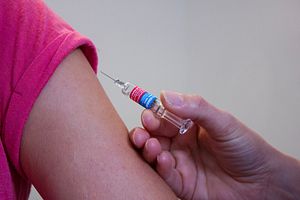Measles and rubella are some of the most infectious and deadly diseases humanity has encountered. Both can cause life-threatening illness, especially among children, and prey on the elderly and immunocompromised, causing unnecessary suffering and premature death. And when a fetus is exposed to rubella in-utero, the disease can cause stillbirth, permanent deafness, heart disease and blindness among other life-long disabilities known as congenital rubella syndrome (CRS).
Despite the threat these diseases pose, our defenses against both are powerful: vaccine. So effective are the measles- and rubella-containing vaccines that they make eliminating the diseases entirely possible, saving hundreds of thousands of lives and averting needles suffering, whatever a country’s income. Doing so, however, is a matter of priority and choice, both by political leaders and the citizens they serve.
Since 2014, when eliminating measles and controlling rubella/CRS was identified as one of the Southeast Asia Region’s Flagship Priorities, progress has been strong across parts of South and Southeast Asia. Bhutan, the Maldives, North Korea and Timor-Leste have eliminated measles. Bangladesh, Bhutan, the Maldives, Nepal, Sri Lanka and Timor-Leste have controlled rubella/CRS. Children in all 11 countries now have access to two doses of measles-containing vaccine via routine immunization programs, while almost all have protection against rubella. By 2017, within just three years of the Flagship program being launched, measles-related deaths decreased by a remarkable 23 percent.
Challenges remain. Implementation of the region’s “strategic plan for measles elimination and rubella/CRS control 2014-2020” has in some countries been limited, leading to sub-national gaps in immunization and surveillance quality. These, coupled with resource constraints, have stymied progress. Though dramatic gains have been made against both diseases, accelerated progress is needed to achieve the region’s own Flagship Priority, to contribute to the “triple billion” targets outlined in WHO’s 13th General Program of Work, and to fully implement the UN Secretary General’s Global Strategy for Women’s, Children’s and Adolescents’ Health.
Strengthening health systems to ensure the immunization of all infants and children will drive immediate progress. Robust immunization systems that reach all people everywhere is the best way to ensure every child in the region receives two doses of the measles- and rubella-containing vaccine within the first two years of life. Key to this outcome is actively identifying who is missing out and why, and strengthening routine systems to meet their needs. This could mean engaging in more detailed micro-planning, enhancing the skills of vaccinators or consolidating cold chain systems. It could also mean improving vaccine management among other goods.
To complement this push, surveillance in all countries should be fortified and laboratory capacity enhanced. High-quality, case-based surveillance makes identifying potential measles and rubella cases more efficient, facilitating the roll-out of targeted interventions as and where needed. Importantly, these systems should exist at the community level, with clear protocols in place for alerting authorities where suspected cases appear. Adequate laboratory capacity will meanwhile ensure health workers can make a rapid and accurate diagnosis when needed.
As countries worldwide are increasingly realizing, promoting demand for vaccines is essential. Region-wide, locally tailored communications campaigns are helping communities grasp the life-saving benefits vaccines provide, and ensuring they know they have a right to those benefits. Crucial to this process has been working with and alongside community leaders to establish strong buy-in and to counter sources of misinformation that could negatively affect a community’s willingness to access vaccination’s game-changing potential. To chart further advances, health authorities must continue to engage communities at the grassroots and ensure demand for vaccination remains at a premium.
They must also secure domestic funds for immunization as a matter of priority. This is especially important as national economies grow and Member States transition away from external funding for immunization initiatives, including the drive against measles and rubella/CRS. The current funding gap for measles elimination is around $1.30 per live birth in the Region, with both partners and governments needing to step in to achieve the necessary outcomes. History shows that should attention, resources or public buy-in falter, vaccine-preventable diseases can – and do – return with a vengeance.
That possibility cannot be entertained. As with the region’s victory over wild poliovirus, which was achieved more than five years ago, the scourges of measles and rubella/CRS can also be eliminated. WHO is committed to achieving these outcomes and will continue to provide technical and operational support as and where needed. As recent gains attest, measles- and rubella- containing vaccines work, and they do so with powerful, life-saving effect. We must continue to harness vaccination’s full potential so that every child in the Region is healthy, happy and has full protection against all vaccine-preventable diseases.
Poonam Khetrapal Singh is the Regional Director for WHO South-East Asia.

































